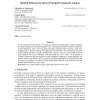Free Online Productivity Tools
i2Speak
i2Symbol
i2OCR
iTex2Img
iWeb2Print
iWeb2Shot
i2Type
iPdf2Split
iPdf2Merge
i2Bopomofo
i2Arabic
i2Style
i2Image
i2PDF
iLatex2Rtf
Sci2ools
127
click to vote
CORR
2007
Springer
2007
Springer
Optimal Solutions for Sparse Principal Component Analysis
Given a sample covariance matrix, we examine the problem of maximizing the variance explained by a linear combination of the input variables while constraining the number of nonzero coefficients in this combination. This is known as sparse principal component analysis and has a wide array of applications in machine learning and engineering. We formulate a new semidefinite relaxation to this problem and derive a greedy algorithm that computes a full set of good solutions for all target numbers of non zero coefficients, with total complexity O(n3), where n is the number of variables. We then use the same relaxation to derive sufficient conditions for global optimality of a solution, which can be tested in O(n3) per pattern. We discuss applications in subset selection and sparse recovery and show on artificial examples and biological data that our algorithm does provide globally optimal solutions in many cases.
CORR 2007 | Education | Non Zero Coefficients | Sample Covariance Matrix | Sparse Principal Component |
Related Content
| Added | 13 Dec 2010 |
| Updated | 13 Dec 2010 |
| Type | Journal |
| Year | 2007 |
| Where | CORR |
| Authors | Alexandre d'Aspremont, Francis R. Bach, Laurent El Ghaoui |
Comments (0)

